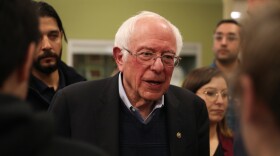The American attack that targeted and killed Iranian General Qassem Soleimani in Iraq left the future of America’s foreign policy in the region uncertain.
Iran has sworn to retaliate, despite further threats from President Trump. Trump ordered the airstrike without notifying Congress. The attack drew praise and condemnation along party lines, including among Democrats running in the presidential primary.
With less than a month to go until the Iowa Caucus, WBUR senior political reporter Kimberly Atkins joined Weekend Edition host Sharon Brody to discuss what the ramifications of the strike could be for those vying to replace President Trump as commander-in-chief.
Interview Highlights
On how whether this brings the focus of the primary to foreign policy concerns
It depends. If we see an escalation — the type of escalation that Democratic candidates are warning against — I think it has to. There’s no choice but for these candidates to start addressing this issue. But on the other hand, if we don’t see immediate action, or if there are some retaliations by Iran … that don’t grab headlines, I think we very well may see the candidates go right back to focusing on the domestic issues they’ve been laser-focused on so far.
On how the candidates may try to distinguish themselves
I think so far we’ve seen them be in unison in condemning this action by President Trump … You have seen some jockeying of positions between them a little bit. You see Bernie Sanders staking out a more non-interventionist approach, while other candidates have taken other positions.
On the candidates’ experience in foreign policy
Joe Biden has by a long shot more foreign policy experience than anybody currently in the race. He is the former vice president … and he acted as one of the president’s top diplomats in that administration. Even people like Bernie Sanders who have been in the Senate for a really long time just don’t have that same level of foreign policy experience.
[Biden has faced criticism] primarily [for his] 2002 vote in favor of the Iraq war. That’s something that turned out to be very unpopular, and we’ve subsequently learned a lot about the justifications for that war, which has caused some problems for Joe Biden and his campaign, something Bernie Sanders is quick to point out. And also, not every foreign policy position taken by the Obama administration was without controversy, and Joe Biden has to explain those too.
Elizabeth Warren has been trying to straddle lanes … you’ve already see her sort of shift a little bit. Her initial statement after the strike called Soleimani a murderer, and she got some pushback from progressives on that about using ‘warmongering’ kind of language. Her next statement pulled back, didn’t really refer to him much at all, except to call him an Iranian military leader — a big change in tone that sort of shows the fine line that Senator Warren needs to walk here.
On a wider conversation about U.S. role in the world
I think that might be one way [we’ll see the candidates talk], regardless of what response we see from Iran. When you think about past military action … it’s always been in close consultation and usually in conjunction with our allies. If you look at this strike, it was largely met with criticism from those countries, criticisms that U.S. officials like Secretary of State Mike Pompeo largely dismissed. It’s very different, and that does give the Democratic candidates an opportunity to talk about America’s place in the world and how the Trump administration has changed that.
This article was originally published on WBUR.org.
Copyright 2020 WBUR







